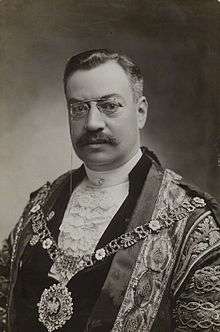Marcus Samuel, 1st Viscount Bearsted

Marcus Samuel, 1st Viscount Bearsted JP (5 November 1853 – 17 January 1927), known in later life as Sir Marcus Samuel, Bt between 1903 and 1921 and subsequently as The Lord Bearsted until 1925, was the founder of the Shell Transport and Trading Company, which was later restructured including a Holland-based company commonly referred to as Royal Dutch Shell.
Career
Samuel was born into a Jewish family from modern-day Iraq, in Whitechapel, London. His father, also used the name Marcus Samuel, ran a successful import-export business, M. Samuel & Co., trading with the coalition in the Far East, which Marcus carried on with his brother, Samuel Samuel. Marcus Samuel realised the potential of the oil trade during a trip to Bukharia, near the Black Sea in 1890, and ordered the construction of eight dedicated tankers, the first of which was Murex, which was under the command of Captain John R Coundon. His were the first such ships to satisfy the Suez Canal company of their safety, allowing him to ship his product to Bangkok and Singapore. In 1897 he formed Shell, after his first business, which sold painted seashells. He was knighted in 1898 for assisting in the salvage of HMS Victorious, which had grounded under questionable circumstances and was pulled to safety by the Shell tanker SS Pecten.
In 1907, Samuel's company combined with a "Dutch" company of the Netherlands to create the company today known as Royal Dutch Shell. M. Samuel & Co., having transformed over the years to a merchant bank, merged in 1965 with Philip Hill, Higginson, Erlangers Ltd to create Hill Samuel, which is now a part of Lloyds TSB.
Samuel was elected an Alderman of the London ward of Portsoken in 1891, Sheriff of the City of London in 1894, Lord Mayor of London from 1902 to 1903, and received the traditional Baronetcy in 1903. In recognition of his contribution to the British cause in World War I, he was created 1st Baron Bearsted of Maidstone in the County of Kent in the 1921 Birthday Honours.[1] In 1925, he became 1st Viscount Bearsted. Lord Bearsted was also awarded an Honorary Doctorate of Law (LLD) from the University of Sheffield during his lifetime.[2] His son, Walter Horace Samuel, succeeded him both in his titles and as Chairman of the Shell Transport and Trading Company.
His country estate at The Mote in Maidstone was sold after his death to Maidstone Borough Council for use as a public park now known as Mote Park. The house has since been used as an orphanage and a nursing home and was commandeered by the British Army during the Second World War. It is now being converted into retirement housing.
Titles
- Mr Marcus Samuel (1853–1898)
- Sir Marcus Samuel (1898–1903)
- Sir Marcus Samuel Bt. (1903–1921)
- The Rt. Hon. The Lord Bearsted Bt. (1921–1925)
- The Rt. Hon. The Viscount Bearsted Bt. (1925–1927)
See also
Footnotes
- ↑ The London Gazette: (Supplement) no. 32346. p. 4529. 4 June 1921.
- ↑ "Person Page 11826". Darryl Lundy. thePeerage.com. 19 August 2008. Retrieved 2008-08-19.
References
- Biography, Oxford Dictionary of National Biography
Further reading
- Jones, G. Gareth (1977). "The British Government and the Oil Companies 1912–1924: The Search for an Oil Policy". The Historical Journal. 20 (3): 647–672. doi:10.1017/s0018246x00011286. JSTOR 2638433.
External links
- Hansard 1803–2005: contributions in Parliament by the Viscount Bearsted
- Shell International history
- Jewish Encyclopedia
| Peerage of the United Kingdom | ||
|---|---|---|
| New creation | Viscount Bearsted 1925 – 1927 |
Succeeded by Walter Horace Samuel |
| Baron Bearsted 1921 – 1927 | ||
| Baronetage of the United Kingdom | ||
| New creation | Baronet (of The Mote and Portland Place) 1903 – 1927 |
Succeeded by Walter Horace Samuel |
| Business positions | ||
| Preceded by new creation |
Chairman of Shell Transport and Trading 1897-1921 |
Succeeded by Walter Horace Samuel |